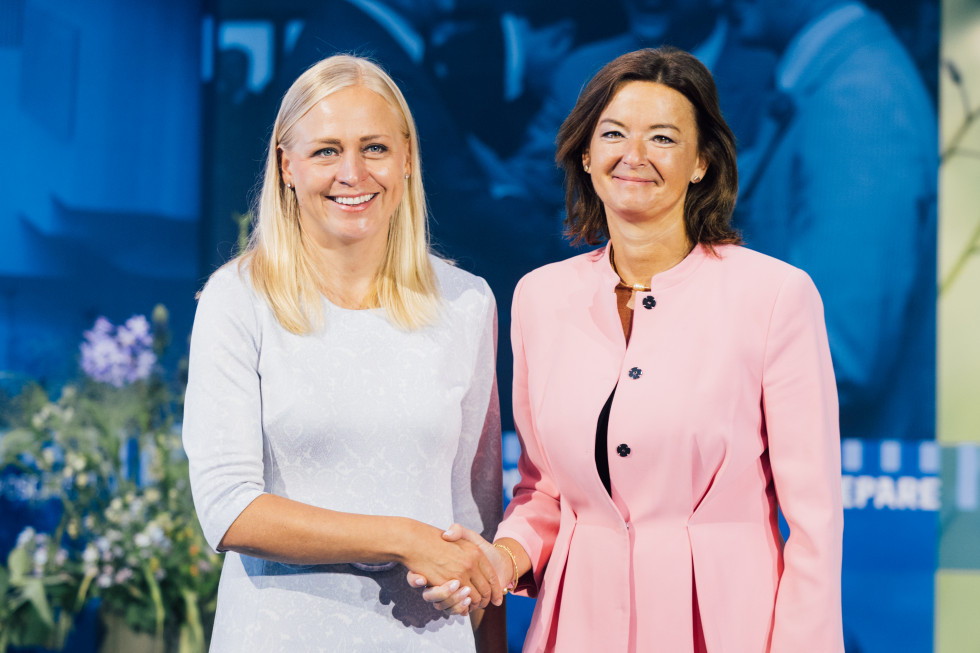Minister Fajon at the conference on the 50th anniversary of the Helsinki Final Act: "Double standards are unacceptable"

Minister Fajon shaking hands with Finnish Foreign Minister Elina Valtonen | Author Ministrstvo za zunanje in evropske zadeve
“We are witnessing the highest number of armed conflicts and civilian casualties since the Second World War. The world order is in crisis, with the rule of power prevailing over the power of rules. Countries, civil society and the media share a common mission to promote peace and democracy, but everyone must take responsibility for their own actions. As politicians, we must lead by principle and by example if we want to remain credible. However, when it comes to promoting peace, democracy and human rights, double standards must not be tolerated. It is unforgivable that children in Gaza are starving and dying right now,” she said. She praised Finland for placing cooperation with civil society at the heart of its OSCE Chairmanship programme. “Civil society acts as a crucial link between the citizens and the government, helping people to organise and defend themselves and hold those in power accountable. When civil society is active, informed and committed, democracy is more likely to be responsive, responsible and fair,” she explained. According to Minister Fajon, particularly given the current challenges to democracy, the rise of disinformation and the decline of trust in democratic institutions, it is necessary to invest more in the resilience of societies and in dialogue with civil society: “We need independent institutions, free judiciary and free media. We must strengthen civil society, involve young people and, above all, listen to each other and hear each other better.”
“As we consider this historical moment, it is important to note that we are not living in a time of peace, but rather in a period of serious crisis in Europe and many other parts of the world. Russia’s constant, unprovoked and unjustified aggression against Ukraine is the greatest security threat since the signing of the Helsinki Final Act and is shaking the foundations of European security,” said Minister Fajon. She added that this is not only a direct attack on peace, but also a systematic attack on human rights and a deliberate undermining of democracy in our region. It is an attack on the principles of the Helsinki Final Act, and we must protect these principles by all means necessary to secure peace in Europe.
During the discussion attended by the Slovenian Minister, the former President of the OSCE Parliamentary Assembly, Pia Kauma, and the Ukrainian human rights activist and 2022 Nobel Peace Prize laureate, Oleksandra Matviichuk, it was agreed that, 50 years after the adoption of the Helsinki Final Act, this milestone serves as a reminder that the OSCE's commitments and principles are still crucial for maintaining international peace based on international law, as well as for strengthening democratic institutions. The participants emphasised that Russia’s constant, unprovoked and unjustified aggression against Ukraine poses the greatest security threat since the signing of the Helsinki Final Act, shaking the foundations of European security in the process. Moreover, this aggression is not only a direct attack on peace, but also a systematic attack on human rights and a deliberate undermining of democracy in our region.
On the margins of the conference, Minister Fajon held meetings with the host, Finnish Foreign Minister Elina Valtonen, OSCE Secretary-General Feridun Sinirlioğlu and Belarusian opposition politician Sviatlana Tsikhanouskaya.
As the chair of the OSCE’s Economic and Environmental Committee this year, Slovenia is also a member of the core group striving to achieve global recognition of the human right to a clean, healthy and sustainable environment. The destruction of ecosystems, polluted water resources and agricultural disturbance pose long-term threats to regional stability. A stable and secure environment is essential for protecting human rights and the rule of law, and for promoting social and political inclusion – all of which are vital for a functioning democracy. The OSCE's efforts to prevent conflicts, monitor elections and strengthen democratic resilience promote this important relationship between security and democracy. Slovenia is strongly committed to this security architecture and remains a staunch advocate of effective multilateralism, firmly believing that security threats can only be resolved through dialogue, cooperation and respect for international law.
The Helsinki +50 conference was opened by Finland's President Alexander Stubb. Other speakers included António Guterres,Secretary-General of the United Nations (via video conference), Volodymyr Zelenskyy, President of Ukraine (via video conference), Feridun Sinirlioğlu, OSCE Secretary-General, , and Volker Türk, UN High Commissioner for Human Rights.

